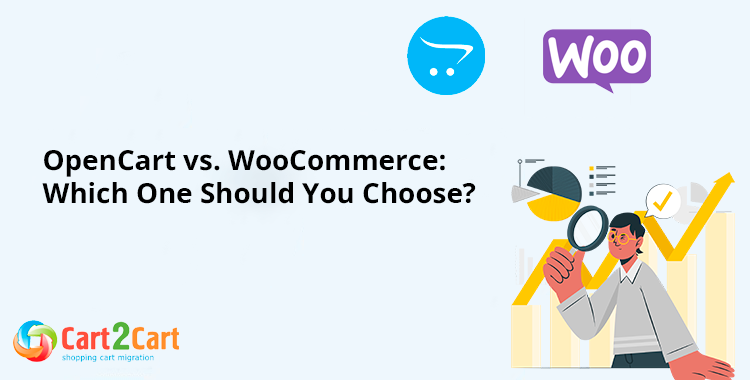 Choosing the right eCommerce platform is essential for building a successful online business. Two popular options that many store owners consider are OpenCart and WooCommerce. While both platforms offer powerful eCommerce capabilities, they cater to different types of users and business needs. In this article, we'll compare OpenCart vs. WooCommerce, examining their features, ease of use, customization options, scalability, pricing, and overall suitability for your business.
Choosing the right eCommerce platform is essential for building a successful online business. Two popular options that many store owners consider are OpenCart and WooCommerce. While both platforms offer powerful eCommerce capabilities, they cater to different types of users and business needs. In this article, we'll compare OpenCart vs. WooCommerce, examining their features, ease of use, customization options, scalability, pricing, and overall suitability for your business.
Ease of Use
OpenCart
OpenCart is a standalone eCommerce solution that requires installation, hosting setup, and manual configuration. It has a user-friendly admin panel, but setting up and managing the store can be a bit challenging for beginners. If you lack technical skills, you might need assistance from a developer.WooCommerce
WooCommerce is a WordPress plugin, meaning you must first have a WordPress website to use it. However, since WordPress is widely used and beginner-friendly, WooCommerce is relatively easy to set up. Many hosting providers offer one-click WooCommerce installation, making it accessible for non-technical users. Winner: WooCommerce (more beginner-friendly and integrates with WordPress easily).Customization & Flexibility
OpenCart
OpenCart offers a modular structure, allowing developers to add extensions and customize store functionality. It has a marketplace with thousands of extensions and themes, but extensive modifications often require coding knowledge.WooCommerce
WooCommerce benefits from WordPress's extensive plugin ecosystem, providing unlimited customization options. It supports page builders, custom themes, and thousands of plugins, making it one of the most flexible eCommerce solutions. Winner: WooCommerce (more customization options with WordPress plugins and themes).Scalability & Performance
OpenCart
OpenCart is lightweight and performs well on basic hosting plans, but as your store grows, you may need to invest in a dedicated server or VPS. High-traffic stores require additional performance optimization.WooCommerce
WooCommerce's scalability depends on WordPress hosting. With the right hosting provider (e.g., managed WordPress hosting), WooCommerce can handle large product catalogs and high traffic levels effectively. Winner: Tie (both platforms can scale with the right hosting and optimizations).
SEO & Marketing Tools
OpenCart
OpenCart provides basic SEO settings, such as custom URLs, meta tags, and redirects. However, it lacks built-in blogging capabilities, which are essential for content marketing.WooCommerce
WooCommerce has advanced SEO capabilities through WordPress plugins like Yoast SEO and Rank Math. Additionally, WordPress is a powerful content management system, making it ideal for driving organic traffic through blogging and content marketing. Winner: WooCommerce (stronger SEO tools and content marketing capabilities).Payment & Shipping Options
OpenCart
OpenCart supports multiple payment gateways, including PayPal, Stripe, and Authorize.net. Shipping options can be configured manually, and extensions are available for additional functionality.WooCommerce
WooCommerce supports a wide range of payment gateways (PayPal, Stripe, Square, etc.) and integrates seamlessly with various shipping solutions. It offers WooCommerce Shipping, which includes real-time shipping rates and label printing. Winner: WooCommerce (better integration with various payment and shipping providers).Security & Support
OpenCart
OpenCart is self-hosted, meaning security depends on your hosting provider and installed extensions. Regular updates and security patches help keep the platform secure, but manual maintenance is required.WooCommerce
WooCommerce benefits from WordPress security plugins and managed hosting solutions that offer built-in security measures. Regular updates, firewalls, and SSL certificates provide additional protection. Winner: WooCommerce (stronger security options through managed hosting and plugins).Pricing & Total Cost of Ownership
OpenCart
- Free to download
- Requires domain & hosting costs
- Premium themes and extensions can add extra costs
- Developer assistance may be needed for advanced customizations
WooCommerce
- Free WordPress plugin
- Requires WordPress hosting (cost varies based on provider)
- Many free and premium plugins available
- More DIY-friendly, reducing reliance on developers
Final Verdict: Which One Should You Choose?
Choose OpenCart if:- You prefer a lightweight, standalone eCommerce solution
- You have some coding experience or access to a developer
- You need a store with basic features and minimal customization
- You already use WordPress or plan to build a blog alongside your store
- You want extensive customization options and a large plugin ecosystem
- You prioritize SEO, content marketing, and multi-channel sales


